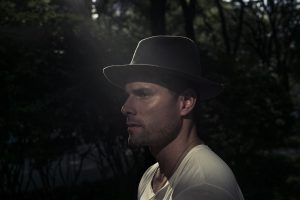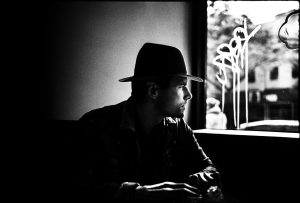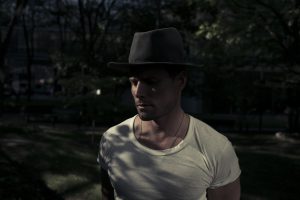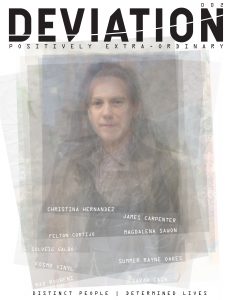Jason Lopez: Soaring With

Photo by Joseph Michael Lopez
By Ash Hoden
Speaking with actor Jason Lopez requires focus. Thoughts escape his mind in a ceaseless outpouring, leaping from one to another in an intricate web of interlocking tangents that don’t at first appear to interlock. But once the tangents are exhausted, he circles back and draws a conclusion that reveals a sketch of the tangled circuitry connecting beginning to end. A friend of mine calls it “soaring,” this stream of consciousness mode of communication. It is a term I appreciate, much the way I appreciate the act itself. Soaring transforms a basic conversation into an exploration. For example, when I ask Lopez about his childhood, within moments the tangents spiral outward from the nucleus of family and friends in South Florida, loosely drafting the framework of a much larger story. He’s not simply telling, but testing and prodding his own history for meaning or substance he hasn’t yet acknowledged.
“I was like a lost little kid running around in South Florida. There was no discipline about where I should be, where should I go. I was like a wanderer. Climbing trees, building tree houses, finding wood… I was always creative. But I realized when I got older… Learning later on, I realized, maybe I need to go to therapy to figure out some of the things going on. I realized, like, I learned to be with myself because I didn’t have anywhere to express. I think that’s one of the reasons why, when I first started acting on stage when I was eighteen, I was like, I gotta do this. My teacher said, ‘If you really want to act you’ve got to move to New York. To be a great actor you’ve gotta train. This old little man in the theater in Hollywood, Florida… I remember though that first experience of feeling alive, like I emoted some kind of emotion that I fucking didn’t realize I was imploding in it. And I remember getting feedback and being, like, whoa… I just remember, wow, I felt alive. It felt like I experienced my life, instead of being in my head. Which still goes on.”
Soaring is not so much about precise wording — expressing complete sentences or ideas in a clear and concise manner — but the ways in which memory connects a number of seemingly unrelated thoughts or events through associations of meaning. What thread links Lopez’s childhood freedoms, his wanders in nature, the thrill of being on stage at the age of eighteen, and his life in New York? I’m exploring with Lopez. By soaring he’s bringing me along with him. I may have been the one to ask, but these questions about his life and childhood are his nonetheless.
Lopez and his two siblings are first generation Americans who were raised by a single mother from Cuba. She worked three jobs to support her family. His father is from Puerto Rico. “It was kind of tough. At one point we had to live in one room and give up our two dogs that we’d had all our life. That part… Those little moments… They’re sad. But then, things happened that made me who I am, that I use in my work. I’m so thankful to have an amazing, affectionate, loving mother who was just so open to us and just letting us do what we wanted. She never pushed us, “You gotta do this you gotta do that.” But at the same time, I kinda wish she did. Or maybe it was just that I was too rebellious. She was really just trying to survive; to bring food to us.”
In middle school another student encouraged him to take a peer counseling class. She helped him to answer the questionnaire in the proper way — the way that would get him accepted. Something clicks in his mind as he’s recalling this moment. “I actually just realized: the things she answered, I’ve always meditated and prayed on those things. Thinking about family and friends and god… I think there’s something beyond us that I’m drawn by. I constantly feel like… Even in my art I have to be in constant communication with that. Otherwise, I feel like it’s not real. I feel like it’s not me. That energy is for all of us. I feel like I have to touch that light, allow it to come to me, to share with you. Share that kiss of life. I always said when I was younger, it was about catching one’s emotion, by telling that story the author is trying to tell. So whatever I had to do to bring truth, that spirit, that history of that character — to tell that truth, is what drove me. I gotta find out what’s going on in that story, I gotta find out what this person is really dealing with. What would bring him to this? Create this whole world and just trust it. Just keep living in that world and whatever comes out, trust it. I think I definitely work from a place where I have to feel it. But then sometimes that’s not the case.”
Lopez recently won the Best Actor award in the Chelsea Film Festival for his role in PTSD, a film in which he portrayed an American soldier who returned from Iraq with post-traumatic stress disorder. While preparing for the part he conducted extensive research — reading, watching YouTube videos of soldiers speaking about their experiences, or other videos of people on PTSD “rants.” He also met with veterans in person, discussing firsthand what it’s like to return after war. Researching, researching, researching. Absorbing any information he could find. “There are so many stories of PTSD. There’s firefighters, there’s abuse, sexual abuse… PTSD is so different for everyone. We know more of it from the war, but you can have it from 9/11, from everything. [The soldiers in these videos] get very emotional and they want to hold it back.” Lopez speaks as one of the soldiers: “‘Yeah, we don’t talk about it.’ So, what is that, that he doesn’t want to talk about? It’s like everyone has something that [they] don’t want to talk about. It’s hurt and it’s pain, it’s guilt and it’s shame. Whatever it is. Our emotions are universal. If you’re short a dollar or you’re short twenty dollars, you’re still short. You’re fucked. So if you’ve been betrayed, because someone did something to you, and I got betrayed because someone did something to me but in another way…Betrayal is betrayal. Pain is pain. So to have empathy… You can never say I know how you feel. Right? I’m asking. I don’t know. But you can experience, and be in the world of pain. Be in the world of betrayal. Be in the world of being vengeful. Or happiness. Whatever it is. These guys have been dealing with pain. So that pain is universal. We’re all human beings. We all have a heart. We’re all alive. I’m realizing that the pain in this character was so strong that people… And even me the first few times I saw it, I couldn’t watch it. It felt like I was experiencing it again. I didn’t know I was going through all of that until I got out of it. When I was done shooting I looked in the mirror, I lost thirty pounds, I didn’t like what I was thinking, I was starting to isolate myself… It was totally like going through it.”
Lopez began acting at the age of eighteen, taking night classes at an acting school in Florida and attending community college by day. After doing that for a year he moved to New York. I ask how it was to arrive in the city.

Photo by Joseph Michael Lopez
“When I first got here I was staying in hostels. All these fucking people I didn’t even know. Just weirdos, everyone. Just trying to survive. I lucked out — my first commercial I was sent on, I booked. And it was a national so you get residuals. So here’s a kid who came from nothing… Actually, there was like 500 dollars that I was given by this guy that worked at the gym. He had a supplement place at the gym I used to work out at. I started at the gym really early, like middle school, because I was so skinny and I was just trying to gain some muscle to be strong — really to beat up my brother I’m realizing. They knew I wrestled and I was pretty good — all these guys, this whole community of guys at the gym. I was a younger buck, athletic, regular-sized, not a big guy. ‘There’s no way you can beat that guy.’ He’s like two-sixty, full muscle, meathead. They were like, ‘There’s no way you can beat him.’ I wasn’t afraid of anyone, because I knew my quickness, or form, whatever… I was like a fucking monkey. I could wrestle with my eyes closed. It was just so much fun. So people would always challenge me. I wasn’t eggin’ anyone on. They said, ‘There’s no way you’re going to beat him. Just wrestle him. I’ll give you 500 dollars if you win. There’s no way you’re going to win. Look at him, look at you.’ Within like twelve seconds I had him on the ground, I pinned him, and I broke his ankle. I didn’t try to break his ankle. That 500 dollars was instrumental to me getting the fuck out of Fort Lauderdale. It might be dramatized but it was definitely like, ‘Alright, I’m outta…’ That’s a lotta money when you’re nineteen!”
If Lopez has one overarching modus operandi it’s total devotion. In his early twenties, in addition to landing spots in television commercials or sweeping floors at studios in exchange for free classes, he studied at Hunter College, at Stella Adler Studio of Acting, and he took parts in student films whenever he could. He read biographies of famous actors and endlessly watched films at night. “If you want to be great you have to be so obsessive that you lose control. To where you lose yourself in it — to find what it is. I don’t know if I created that or read it, but I did that. I would watch In The Name of the Father over and over and over. Literally press play when I woke up in the morning. I was reading plays, and I was doing stage views… I was doing anything where I could just practice my craft, man.” Also, there were odd jobs — working in a bar or taking basic gigs to keep him fed.
At the age of twenty-four he was asked to do an independent film that would be shot in Croatia. He had two lines and needed to be on set for three weeks. But he was studying at Hunter College at the time and had to negotiate with his professors in order to leave — finding the theater professors the most inflexible about him missing class for a film. He risked failing out by taking the opportunity. Martin Sheen was in this film as well, although he and Lopez had no scenes together and never met on the set.
However, one night in the hotel restaurant Sheen was the center of attention for a large media event. The entire cast was sitting with him at a table — wanting to be involved. Lopez arrived from a road trip he had just taken, driving back to the hotel after climbing a mountain in bare feet. He didn’t want any part of the media spectacle. “I went and sat entirely on the other side of the restaurant where it was empty. I didn’t want to seem like I’m trying to kiss anyone’s ass. I was just shy.” Sheen’s wife Janet sat with him, asking Lopez about his life. “Oh, thankfully I have this commercial, I’m going to college, I’m studying acting.” She was intrigued, knowing firsthand the struggles of being a young actor. After the media affair Sheen approached the table and his wife introduced him to Lopez. “I said, ‘How are you doing Martin? I love that film Badlands, the way you depicted the atmosphere.’ I remember using that word, atmosphere. And he looks at me and he’s like, ‘You know, if everybody knew that film I would be a star.’”
Following this introduction, despite Lopez’s reluctance to accept assistance, Janet and Martin Sheen went out of their way to help him. Soon he was introduced to Anna Strasberg, the widow of the famed Lee Strasberg. Lopez recounts their first meeting, “She says, ‘Well, you’ve got to be hungry to be an actor.’ It’s like, ‘I’m not hungry. I’m starving.’ She’s goes, ‘Oh, Lee would have loved you.’” Strasberg offered him a scholarship and Lopez studied at the Lee Strasberg Theater and Film Institute for five years. “Every day full time five classes while I was full time at Hunter. I ended up getting bronchitis, I wasn’t sleepin’ I was just working. Studying every fucking thing. I remember they were like, ‘You’re the only one that uses the library.’ There was this intimate library with all this data, and videos of him giving classes. I was watching everything he ever gave and I was doing it with all of the teachers that were taught by him. And I was doing plays. That’s how I worked. And that’s what I did with PTSD until I fucking lost it. I lost it man.”
The commercials fell off for Lopez when he was twenty-eight. Nothing with television or film. He would get screen tests but no longer landed jobs, and the jobs no longer paid well. “I realized it’s not just about getting in the room it’s about getting the check so you can keep going and doing the work.” His savings rapidly dwindled as he struggled to find work. He tried Los Angeles. Then returned to New York years later, having to once again start from scratch — bouncing between temporary living situations much the way he had done before. Working night gigs… Over the past eight years he struggled to keep a roof over his head.
PTSD, his breakout role, unfurled into a three-year commitment. He met the director Cedric Godin while working on a different project long ago, landing the gig through that connection. Everything coming through his genuinely supportive agent was cliché — bad scripts with roles for typecast Latin characters. Lopez, whose looks don’t match the stereotype implied by his last name, quotes an encounter he once had with John Leguizamo. “He basically told me, ‘Well, you either need to change your name, or you need to be really good.’” Sheen, whose last name is Estevez, also suggested a name change. But Lopez refused. When Cedric Godin offered him the lead in his debut film, the name Lopez was of no consequence. Times had changed and both were up-and-coming talents. Then PTSD went into production three different times. “It was such a deep role, it was almost like the art gods were like, ‘To tell this pain it ain’t going to happen in one shooting. You guys are going to have to come back and revisit it.’” Although he struggled to pay bills, the extended schedule gave him the luxury of time. He was able to rehearse and explore the role; explore the world of PTSD in more depth. “I lost my job. I got fired. I was fucking on edge.”
Marlon Brando and Daniel Day-Lewis are mentioned more than once in my talk with Lopez, who discusses their ability to stay in character for extended periods. For PTSD, Lopez didn’t entirely come out of that character. Hearing him speak about his mental state at the time gives the impression that, from the act of portraying it, he manifested PTSD in himself. Long after the film was complete Lopez invested his last bit of money in a plane ticket to Thailand. There he attended an eleven-day silent meditation. He also shaved his head and volunteered at a farm for two months, continuing to meditate and practice martial arts as well. “I remember one day just balling. And I was really lean. Looking back, that was my healing — doing stuff like that. Honestly, I don’t feel like I ever healed from it until recently. It took awhile. I just couldn’t BS these guys. You can’t tell their world if you haven’t lived it.” Lopez qualifies this statement by making it clear to me that he’s not attempting to put his experiences on par with going to war. He’s simply conveying the fact that he needed to understand PTSD from the inside in order to respectfully portray it on screen. He quotes a recent statistic: “Twenty-two soldiers are dying each day in America because of PTSD-related suicides. They have more reasons to fear us [greater society], than we have to fear them.”
“When Brando played the Godfather he created the world of what it is to be a bulldog. That’s how he was. He was like this, ‘In the kingdom of the blind the man with one eye is king.’” Lopez does a wicked Brando impersonation. “In my rehearsals, in my exploring, I was like, ‘Alright this guy isolates himself.’

Photo by Joseph Michael Lopez
I’m realizing guys that come home from war, they isolate themselves. They don’t want to be around anyone. So, the animal of a possum came to me. Because when I was a kid I grew up with possums.” Lopez freezes his face with his teeth barred and stares at me the way a possum would. “And that’s why [the soldiers are] always worried — they come home and everyone looked at ‘em like [they were scary]. I always looked at possums like, ‘Those things are fuckin’ scary.’ And when you get close to em, they freeze.” He makes his fierce face again. “So, I would explore in my body what it was like to be a possum. And then I made it human. Like Brando with the dog. I would walk with that concept all of the time. Everyday it would start coming to me. Everything that I worked on — the story and the emotion. I remember the possum thing came to me when I wasn’t even trying to find it. I think I was walking somewhere and I was like, ‘I need to explore that.’”
I mention to Lopez that the possum is a reference from his childhood, when he wandered in the forest without parental guidance. He hadn’t yet put the two together. All this time he’s been soaring, but only now is he taking off.
Get Deviation Issue 002 (Print or Digital)
[fbcomments width="100%" num="10" ]



